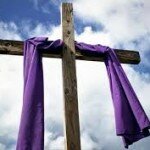THE BIG DRAMA
FADA HENRY IBE
It is a feast of contradictions today. We celebrate the triumphal entry of a king who ends up dying like a criminal. It’s Palm Sunday and also Passion Sunday! The day of “Hosanna”,and the day of “Crucify him!” A day of acclamation – “blessed is he who comes in the name of the Lord”, and a day of denials – “I do not know him!” It’s a day of paying homage – people throwing their cloaks on the road, and also a day of mockery: “Play the prophet…who hit you then?”
It is a huge drama and each one of us, depending on our spiritual disposition, can play any of the characters. First is Jesus, the King who arrives on the back of a colt instead of a war horse. This shows him as the King of peace; it also shows the humility by which he reverses the disobedience of Adam, to reconcile us with the Father. We have the crowd who enthusiastically waved palm branches, only to turn against him a few days later. We have his closest disciples who deserted him when he needed them most. Peter had vowed to stay by the Lord even unto death but denied him thrice in a matter of hours.
There is Judas Iscariot who betrayed his Master with a kiss. We have Pontius Pilate who knew the truth but bowed to political pressure in condemning an innocent man. We have the chief priests and the scribes whose hearts were completely closed to Jesus’ message and would stop at nothing to destroy him. We have Simon of Cyrene who was forced to carry someone else’s cross. We have Joseph of Arimathaea who courageously asked Pilate for Jesus’ body for burial. Then we have Mary who stood by in agony to watch all the drama unfold.
We play the jubilant crowds waving palm branches when we participate in today’s procession with a heartfelt devotion. In those days, palm branches were a sign of victory. Palm trees were not native to Italy, and so when the Romans started making conquests in the Mediterranean, the generals brought the plant back to Rome as souvenir. So just like the crowds waved palm branches to acclaim Jesus’ triumphal entry into Jerusalem, we too wave our palm branches today to celebrate his victory over sin and evil.
We play the Good Friday mob when we lack a solid commitment to the Lord and the teachings of the Church. We support the Church when it is convenient and then criticize it when we fail to keep up with the teachings. This is mainly caused by lapses in the sacramental life and easily leads to moral relativism. We play the fleeing disciples when we fail to live out our faith for fear of ridicule or criticism.We play the denying Peter when we neglect our prayers and become self-assured of our own spiritual strength. When the going gets tough we readily jump to “native doctors” or some “miracle” place. We play Judas Iscariot when we live a life of hypocrisy – saying one thing and doing the other. We play Judas when we exploit the things of God for personal gain or take advantage of those we are meant to protect. We play the chief priests and scribes when we persist in our sins and refuse to utilize God’s offer of forgiveness. We play the chief priests and the scribes when out of envy we seek to discredit or destroy the good works of other people.
We play Pontius Pilate when we turn a blind eye to injustice- when we fail to defend the most vulnerable in our midst. We play Pilate when we show apathy and wash our hands of responsibility towards the needy, because it does not affect us personally.We play Pilate when we cheat or lie in our dealings with others.We play the soldiers when we disrespect and mistreat those we don’t like. We play Simon of Cyrene when we do the right thing in unfavourable circumstances; when we extend a helping hand at our own inconvenience. We play Joseph of Arimathaea when we pick up the courage to fight injustice or to give redress to those unjustly treated. Also, we play Joseph of Arimathaea when we make reparations for our sins through good works.
We play the suffering Jesus when we love and pray for our enemies and those who treat us badly. He reconciled Pilate and Herod – two enemies who has a mutual interest in his downfall. He also prayed to his Father to forgive his killers. We play the dying Christ when we look at others with tenderness and compassion, especially those who have hurt us, and summon the courage to wholeheartedly forgive them as he forgave the dying thief. We become like the dying Jesus when we make a total surrender to the will of God no matter the situation.We play Mary when we are helpless in a bad situation but maintain our total trust and hope in the Lord.
But the best character is that of Christ in his humility. By this we lower ourselves to raise others, loving and serving them. We are called to imitate the kenotic (self-emptying) sacrifice of Christ. The infinite God taking flesh in finite humanity is humility par excellence. As Jesus rides the colt of humility into Jerusalem, so he rides on the wave of humility through this sinful world in order to show us the way to heaven.
So as we mark Jesus’ triumph in defeat, the restoration of our life through his death, we pray for the grace to become more like him. May he help us to carry our palm branches not only in Church but at home and everywhere, spreading the message even as we ride our own colt of humility – the path to true greatness and enduring happiness!
Readings: Isaiah 50:4-7; Psalms 22:8-9, 17-18, 19-20, 23-; Philippians 2:6-11; Matthew 26:14–27:66 or 27:11-54
__________________
Fr. Henry Ibe www.frhenryibe.com,
Read also Related Posts
Comments
comments



 WE ARE FAMILY
WE ARE FAMILY
 CHRISTIAN DISCIPLESHIP, A PERSONAL ENCOUNTER WITH GOD
CHRISTIAN DISCIPLESHIP, A PERSONAL ENCOUNTER WITH GOD
